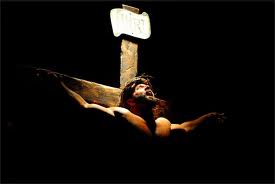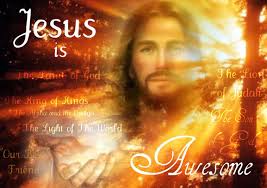
– 14-03-2021 –
Gospel reading: John 3:14-21
 vs.14 Jesus said to Nicodemus:
vs.14 Jesus said to Nicodemus:
“The Son of Man must be lifted up as Moses lifted up the serpent in the desert,
vs.15 so that everyone who believes may have eternal life in him.
vs.16 Yes, God loved the world so much that he gave his only Son, so that everyone who believes in him may not be lost but may have eternal life.
vs.17 For God sent his Son into the world not to condemn the world, but so that through him the world might be saved.
vs.18 No one who believes in him will be condemned; but whoever refuses to believe is condemned already, because he has refused to believe in the name of God’s only Son.
 vs.19 On these grounds is sentence pronounced: that though the light has come into the world men have shown they prefer darkness to the light because their deeds were evil.
vs.19 On these grounds is sentence pronounced: that though the light has come into the world men have shown they prefer darkness to the light because their deeds were evil.
vs.20 And indeed, everybody who does wrong hates the light and avoids it, for fear his actions should be exposed;
vs.21 but the man who lives in the truth comes out into the light so that it may be plainly seen that what he does is done in God.”
***************************************************************
We have four commentators available from whom you may wish to choose . Scroll down to the name of the commentator.
Michel DeVerteuil : Holy Ghost Father, late director of the Centre of Biblical renewal in Trinidad. W.I
Thomas O’Loughlin: Prof of Historical Theology University of Nottingham NG7 2RD
Sean Goan: Studied scripture in Rome, Jerusalem and Chicago and teaches in Le Chéile Schools
Donal Neary SJ: Editor of The Sacred Heart Messenger and National Director of The Apostleship of Prayer.
****************************************
Michel DeVerteuil
Lectio Divina with the Sunday Gospels
www.columba.ie
General Comments
You will notice certain themes running through the entire passage. Each of them is expressed in a different metaphor, each has its special emphasis. Some of the themes are well known to us; others are more new. John is like an arranger who works out some variations of the basic tune of a well known music piece. We are like those who must sit back and listen to a steel band show – like our famous local panorama which takes place on the weeks before our Trinidad Carnival on shrove Tuesday.
In reading the passage then we do it with this awareness at the back of our minds. We take every section very slowly, going through one at a time and giving each one our perfect attention.
 – Verses 13 to 15 : The theme here is that the Son of Man who will eventually be crucified needs to be lifted up on high so that he can become a source of true life for all his followers. This must happen if he is to have this effect on us. His “being lifted up” on high makes him stand out from all who look on him. We realise then how much he has to offer his people, especially those of us who are in the desert as Moses and his followers were and as he himself was on the cross at Calvary.
– Verses 13 to 15 : The theme here is that the Son of Man who will eventually be crucified needs to be lifted up on high so that he can become a source of true life for all his followers. This must happen if he is to have this effect on us. His “being lifted up” on high makes him stand out from all who look on him. We realise then how much he has to offer his people, especially those of us who are in the desert as Moses and his followers were and as he himself was on the cross at Calvary.
St John adds a little variation. He remembers that the serpent who had appeared to the Israelites in the desert in the time of Moses was originally a symbol of death. Our present source of life was originally an object that spoke of death and destruction. A symbol of shame had now become for us a great source of life.
We think of times in our own lives when what was originally for us a mark of death now becomes a sign of life. We think of new life arising out of
* people who when we saw them first reminded us of death;
* the possibility of destruction in this present life which now becomes a source of new life;
* death existing together with the signs of new life.
Death now becomes a source of new life. We stay with the metaphor until it becomes this reality for us. The passage is also telling us something important about the people who watch the death of Jesus. They have a large fund of good will among themselves and so look at this image of death. What had seemed at first only of little consequence, with no special message for God’s people, becomes an invitation to new life.
– Verse 16a :God’s love for us is expressed practically by his giving us what is most precious to him – his own dear son whom he loved very specially. He wanted to deliver him from all evil but ended up seeing him sacrificed on the cross. It was therefore a tremendous act of service to us from the great God.
– Verse 16b: The motive for and indeed the actual fruit of God’s love is expressed in two possible outcomes for people:
– Being lost, on the one hand. We must make an effort to understand this concept: being lost includes all the aspects that we know well – not found, left alone by ourselves, without any one that we can turn to.
– Having eternal life, on the other hand includes concepts like a gift that does not end with death in any form.
– Verse 17 brings back the teaching of the previous verse through the metaphors of condemning and being saved. We need to spend some time with each of the consequences:
* condemning includes concepts like having no hope;
* being saved includes things like being looked after.
– Verse 18 brings back the metaphor of being condemned and links it to another conclusion:
– the option of believing in love
– not believing in God’s only Son given for us.
In verse 19 Jesus reflects on how people are condemned;
the only valid condemnation is the one which comes from within oneself.
– In verses 20 and 21 the teaching is clarified with an analysis of how we make our choice of darkness or light. We remember times when we made the choice to live from the truth of ourselves, not to rely on what went outside but from what was within. Our deep choices always comes from ourselves, not from outside.
Prayer Reflection
Lord, we would like to be a source of life for others without cost to ourselves.
We thank you for true leaders we have met who knew the law of life as Jesus did,
that we must make ourselves vulnerable, be open to failure and humiliation,
allowing ourselves to be lifted up as Moses lifted up the serpent in the desert,
if our followers are to find life in us.
Lord, there was a time when we were afraid of death, of failing, suffering, being rejected by others.
This fear was a bondage for us.
We thank you that you lifted up a Son of Man before us and invited us to look honestly at things that frightened us:
we looked on that Son of Man and how we ourselves tend to live.
We realized then that his death was truly a source of new life for us.
 Lord, we thank you for all those who love
Lord, we thank you for all those who love
* parents, grandparents, spouses, community leaders –
*they love so much that they give what is most precious to them,
their careers, their future security, their own friends,
so that those whom they love might experience that they can trust and so not be lost but live.
Lord, we think today of those in our society who are lost:
*Adult children who were halted in their growth by childhood hurts
* addicts to drugs or alcohol;
* those who are eaten up with bitterness and envy;
* those who cannot forgive.
We remember that your will is that they should not be lost;
for them you gave up your only Son.
Forgive us that we have not mediated your love to them.
Lord, we pray for teachers in schools, church communities, families.
Remind them that you have sent them into their communities
not to condemn, but so that through them their charges might be saved.
Lord, there is nothing more terrible in life than to feel condemned
*to live without purpose;
* to experience failure and rejection whatever happens;
* to know that you will never be admired by others;
and the root of this is not believing that you are loved.
Help us to be the presence of your only Son in the world,
so that people might not go through life feeling condemned.
Lord, we pray for your church, that we may never give in to the tendency to condemn.
Help us to focus on being true to you
so that others may come to us not out of fear of being condemned
but out of the truth that is in themselves.
Lord, we thank you for the journey to grace that many of us are making during this Lent.
For many years you were calling us, inviting us to look honestly
on our addictions, our vanity, our envy.
We hated the light, avoided it for fear that the truth about ourselves should be exposed.
During these days we were brought to look at ourselves and come out into the light,
feeling inner peace because we knew that what we were doing we were doing in you.
********************************************************
Thomas O’Loughlin
Liturgical Resources for the Year of Matthew
www.columba.ie
I ntroduction to the Celebration
ntroduction to the Celebration
We have gathered here as God’s holy people, and we are God’s work of art, created in Jesus Christ to live the good life as from the beginning he intended us to live it. So we have to be both thankful for his mercy, and sorry for our failures to live life in that way. Since this is the Fourth Sunday of Lent, today is Mothers’ Day – the day when we thank our mothers for all they have done for us, and also express our sorrow for any way we may have hurt them.
Homily Notes
1. As Lent progresses the focus of preaching has to shift from the discipline of Lent itself to that for which it is a preparation: the event of Holy Week and Easter. Therefore, part of the role of preaching in Lent is that it should be a catechesis for the events of the forthcoming festival, so that people can appreciate their significance within the whole Christian year, and can take part in those liturgies with greater understanding. Of all the reforms of the liturgy that took place in the twentieth century, the reform of Holy Week (beginning in 1955 and being progressively reformed until 1970) has probably had the greatest impact on Catholic theology, yet these reforms have had probably the least impact at community level. While the building may be filled for midnight Mass at Christmas, the Easter Vigil usually only attracts a moderate number and has often been relegated in status to that of an ordinary vigil Mass for Sundays with a few extra readings; while on Good Friday many people see little difference between attending the Stations of the Cross and taking part in the Liturgy of the Passion.
2. That being the case, one way to catechise the whole community is to focus now on the days of Holy Week and examine the liturgy of one of the days in detail using the question ‘what will we be celebrating on Holy Thursday?’ as the focus of your explanation.
3. If you choose to go down this route, then today you could begin by ‘going through‘ the liturgy of the Mass of the Lord’s Supper on Holy Thursday. The keynote is that Jesus gathered his people for a meal –something he did often, enjoyed, and was criticised for (cf Mt 11:19). This was an intimate affair of his own people, hence the added horror about Judas one senses in v. 2. A meal has a grammar all its own.
(1) It is around one table (which means we are truly equal in his sight and ‘friends’ – there is no ‘top-table’ and then places for the rest.
 (2) There is a sharing of food. This had been transformed in Jesus’ table ritual to being a central moment in his whole vision for the Father’s new people: a single loaf was broken and anyone who had a share in it was accepting a place among that new people. Uniquely, Jesus asked his table companions to share one cup over which he said a blessing. This established them, through an intimate ritual, as sharing in a common vision and destiny. (This basic table ritual of Jesus, from which our Eucharist derives, was not a Passover ritual – hence we celebrate Eucharist weekly not annually – and this is probably why John omits an ‘institution narrative’ from his account of the meal on the night of betrayal).
(2) There is a sharing of food. This had been transformed in Jesus’ table ritual to being a central moment in his whole vision for the Father’s new people: a single loaf was broken and anyone who had a share in it was accepting a place among that new people. Uniquely, Jesus asked his table companions to share one cup over which he said a blessing. This established them, through an intimate ritual, as sharing in a common vision and destiny. (This basic table ritual of Jesus, from which our Eucharist derives, was not a Passover ritual – hence we celebrate Eucharist weekly not annually – and this is probably why John omits an ‘institution narrative’ from his account of the meal on the night of betrayal).
(3) At any common meal there is an element of showing one’s desire to be of service and to offer of one’s best: one way of doing this in Jesus’ time was to offer the service of foot-washing. Jesus’s action transforms this into making service the basis of community; and this action was so striking that it became a part of many Christian liturgies — now only surviving vestigially.
***************************************************
Sean Goan
Let the Reader Understand
www.columba.ie
Gospel notes: John 3:14-21
In the synoptic gospels there are three predictions of the passion of Jesus in which he outlines what is going to happen to him when he reaches Jerusalem. This, however, is not the case in John where the passion is prepared for in a completely different way. On three occasions Jesus speaks about himself being ‘lifted up‘. The Greek word behind this can mean a literal or physical lifting and also an exaltation, a being raised up or glorified. By means of this deliberate play on words the evangelist explains to us that the passion, for all its injustice and brutality, is a glorious revelation of God’s love.
In this text we have the first prediction of Jesus’ death and here the cross is explained as a saving, healing event. Jesus likens his being lifted up (on the cross) to the lifting up of the bronze serpent by Moses in the desert. This is a reference to the occasion when the Israelites had cried out to God to save them from poisonous snakes (Numbers 28). When they looked at the serpent Moses had fashioned from bronze they were healed. So too Jesus, raised up on the cross, is the sign of God’s infinite love and the source of our healing.
Reflection
In our day-to-day struggle just to get on with the business of living it is unlikely that we go around with the image of ourselves as ‘God’s work of art’. There are many forces at work both within us and outside us which tend to pull us down and to leave us with negative feelings about ourselves and those around us. By contrast, at the heart of the gospel message is the wonderful assertion that we are the handiwork of a God who does not make mistakes. This is the God who so loved the world that he gave his only Son not to bully us into obedience or to threaten us with hellfire but to bring us to life in its fullness. This is terrific news indeed, so let us take steps to ensure that other messages do not drown it out.
***********************************************
Donal Neary SJ
Gospel Reflections
www.messenger.ie/bookshop/
A New Colour
Why rose vestments today? It is the hope of Easter just around the corner. We are on the way, but not there yet. So we wear the colours of joy. Our joy is from the love which has brought us here and made us the work of art we are. Jesus is lifted up on the cross so we may have life. In all our thoughts on lent and the death of Jesus, we are people of the resurrection.
We have many identities in our lives, but our prime belonging is to God, brothers and sisters of Jesus. This is the life of faith, the life of faith in the heart.
 We can often think of God and faith as deadening. Our faith is that he sent his son from love. Jesus is the one who went through all we go through and rose from death. As our faith in this becomes strong, then we find love active from God in our lives. At times when there is little else there, we unite ourselves with the sufferings of Jesus and rise with him. God, being love, promises not an easy life nor magical solutions, but love always.
We can often think of God and faith as deadening. Our faith is that he sent his son from love. Jesus is the one who went through all we go through and rose from death. As our faith in this becomes strong, then we find love active from God in our lives. At times when there is little else there, we unite ourselves with the sufferings of Jesus and rise with him. God, being love, promises not an easy life nor magical solutions, but love always.
We live on amazing grace, and the graced light is Christ. Easter is around the corner, if we take a corner too quickly we crash. In life there is often a call to patience. We live in the light of Easter.
Look on the world – its business, goodness and evil,
and let God’s love for the world become your love.
Lord, by your cross and resurrection, you have set us free;
you are the Saviour of the world and …
